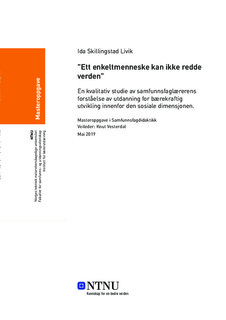Ett enkeltmenneske kan ikke redde verden
Master thesis
Permanent lenke
http://hdl.handle.net/11250/2610425Utgivelsesdato
2019Metadata
Vis full innførselSamlinger
- Institutt for lærerutdanning [3692]
Sammendrag
I 2020 trer den nye fagfornyelsen i kraft, hvor bærekraftig utvikling trekkes frem som ett av tre kjerneelement (Utdanningsdirektoratet, 2017). Per i dag foreligger det en rekke styringsdokumenter, både nasjonalt og internasjonalt som vektlegger viktigheten av å utdanne for en bærekraftig utvikling. Litteraturen viser til at det derimot ikke foreligger en konsensus om hva utdanning for bærekraftig utvikling egentlig innebefatter, hvor det vises til at bærekraftig utvikling i skolen ilegges i stor grad naturfagene, er lite helhetlig og svært læreravhengig. Gjennom spørsmålet; Hvilke perspektiver integreres i samfunnsfaglærernes arbeid med utdanning for bærekraftig utvikling innenfor den sosiale dimensjonen? Har undersøkelsen tatt utgangspunkt i et kvalitativt intervju av seks samfunnsfaglæreres for å få en forståelse av hva de vektlegger innenfor utdanning for bærekraftig utvikling. I denne sammenhengen søkes innsikt i hvordan lærerne forstår den sosiale dimensjonen, og hvordan de vektlegger globalt medborgerskap og handlingsansvaret i henhold til bærekraftig utvikling.
Studien belyser at utdanning for bærekraftig utvikling oppfattes ulikt blant lærerne, hvor det ikke foreligger en universell enighet om fenomenets innhold. Det kan derimot tyde på at lærerne vektlegger at utdanning for bærekraftig utvikling skal myndiggjøre elevene i form av å utdanne ansvarsbevisste elever, som evner å handle bærekraftig. Det tyder på at forståelsen er svært læreravhengig, hvor lærernes personlige engasjement er av betydning. Innenfor den sosiale dimensjonen av bærekraft, uttrykkes en antroposentrisk forståelse av bærekraftig utvikling med vektlegging på mennesket som innehaver av iboende verdi. Studien avdekker at lærerne vektlegger i stor grad en kritisk global medborgerskapsundervisning, hvor de uttrykker kompleksitet knyttet til det internasjonale samfunnet og til strukturelle tilnærminger for å skape en sosial endring. Samtidig uttrykker lærerne en humanitær tilnærming gjennom å uttrykke det moralske aspektet av handling, hvor humanitært arbeid gjennom et individfokus på å endre egne rutiner i en bærekraftig retning vektlegges. Lærerne anser her viktigheten av å spille på elevenes følelsesregister for å skape en virkelighetsnærhet. Dette kan derimot føre til en forståelse av individuelt solidaritetsarbeid, og derav en forståelse av verden som «oss» og «dem». In 2020 the renewed subjects are incorporated, where education for sustainable development is one of three focus points. Today, there exists a range of policy documents, both nationally and internationally, which points to the value of education for sustainable development. However, the literature points to an absence of a clear definition of what’s implied in the expression education for sustainable development. Generally, the literature finds that there is a focus on the natural sciences, but that the approach is not holistic and very teacher-dependent. Through the question “Which perspectives are integrated in the social science teacher’s work towards education for sustainable development within the social dimension?”, this thesis is based on qualitative interviews with six social science teachers to examine what they value within the education for sustainable development. The focus has been to study how the teachers understand the social dimension and how they value global citizenship and the responsibility related to a sustainable development.
This study finds that the expression “education for sustainable development” is perceived differently between the teachers, and that there is a lack of a universal understanding of the contents of the expression. Seemingly, the teachers want to empower the students to make educated choices for a sustainable development. The inconsistency in the perceptions again point to a teacher-dependency, where the teacher’s personal engagement is important. Within the social dimension of sustainability, an anthropocentric understanding of sustainable development with emphasis on the intrinsic value of the human is expressed.
The teachers are found to put heavy emphasis on a critical global citizenship education, where they express the complexity related to the international community and the structural approaches to generating social change. A soft global citizenship education is expressed through emphasis on the moral aspect of actions, where humanitarian work with a focus on the individual changing his or hers routines towards becoming more sustainable. The teachers acknowledge the importance of utilizing the student’s emotional register to generate a familiarity. However, this can lead to an understanding of individual solidarity work, and thereby an understanding of the world as in orientalism, with a distance between “us” and “them”.
